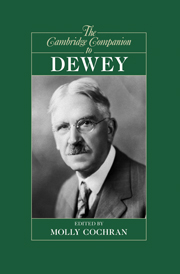Book contents
- Frontmatter
- Introduction
- 1 The making of a democratic philosopher: the intellectual development of John Dewey
- 2 Dewey’s epistemology
- 3 The naturalism of John Dewey
- 4 Dewey’s logic of inquiry
- 5 The primacy of practice in Dewey’s experimental empiricism
- 6 Cognitive science and Dewey’s theory of mind, thought, and language
- 7 John Dewey and action
- 8 Dewey’s moral philosophy
- 9 Ethics as moral inquiry: Dewey and the moral psychology of social reform
- 10 Dewey and pragmatic religious naturalism
- 11 Dewey’s aesthetics
- 12 Dewey’s philosophy of education: a critique from the perspective of care theory
- 13 Dewey’s vision of radical democracy
- 14 Dewey as an international thinker
- Bibliography
- Index
4 - Dewey’s logic of inquiry
Published online by Cambridge University Press: 28 September 2010
- Frontmatter
- Introduction
- 1 The making of a democratic philosopher: the intellectual development of John Dewey
- 2 Dewey’s epistemology
- 3 The naturalism of John Dewey
- 4 Dewey’s logic of inquiry
- 5 The primacy of practice in Dewey’s experimental empiricism
- 6 Cognitive science and Dewey’s theory of mind, thought, and language
- 7 John Dewey and action
- 8 Dewey’s moral philosophy
- 9 Ethics as moral inquiry: Dewey and the moral psychology of social reform
- 10 Dewey and pragmatic religious naturalism
- 11 Dewey’s aesthetics
- 12 Dewey’s philosophy of education: a critique from the perspective of care theory
- 13 Dewey’s vision of radical democracy
- 14 Dewey as an international thinker
- Bibliography
- Index
Summary
Dewey and Peirce shared a common focus on the elaboration of a model of inquiry that seeks to remove doubt concerning the answer to some question by identifying potential answers to the question, ascertaining the evidence available for evaluating the candidacy of such answers as solutions to the problem posed, conducting experiments to acquire more evidence and deciding on the basis of the available evidence which of the potential answers to add to the stock of knowledge. My own proposals concerning how to model well-conducted inquiry depart in several respects from the proposals of both Peirce and Dewey. But these two great philosophers gave classical expression to the ideas that inspired the projects I have undertaken. In this essay, I shall comment on some aspects of Dewey's vision of the logic of inquiry, pointing to important respects in which I depart from his approach. Because I shall be arguing with Dewey, I wish to emphasize here and now that I am arguing not to dismiss him or his ideas but to sharpen some of my ideas by confrontation with one of the points of view that inspired them.
- Type
- Chapter
- Information
- The Cambridge Companion to Dewey , pp. 80 - 100Publisher: Cambridge University PressPrint publication year: 2010
- 8
- Cited by

